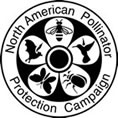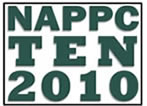 |
10th ANNUAL NAPPC INTERNATIONAL CONFERENCE TASK FORCES |
 |
Task Forces are cross discipline, short-term, project-oriented groupings designed to accomplish a single task (e.g., create a photo exhibit). NAPPC partners will have the opportunity to provide input into groups on which they do not serve. New Task Forces will be created as needed.
The Task Forces are made up of disparate, interested parties who work to accomplish one specific pollinator related task.
If you have not attended a previous NAPPC meeting, you should note:
First, the emphasis is on the work of NAPPC Task Forces, each of which has a specific charge agreed upon before the Conference. Since the NAPPC Task Force format has been responsible for many of NAPPC’s successful endeavors, the Steering Committee has determined that Task Force activity is the highest priority when we meet as a group. That is why the Task Forces will meet twice, once on Thursday and once on Friday (see the Agenda).
During these two sessions, your Task Force will envision your completed project and work through the steps to get there. You will be asked to commit to at least one aspect in the completion of this project. The idea is to diversify the input, mobilize maximum impact, and to spread the work over many participants. You will be encouraged to set realistic time frames and through consistent, collaborative communication and effort, the Task Force will achieve its mission.
The NAPPC Steering Committee, through a series of evaluation interviews determined the Conference goals you see in Section 3 of these materials. Together, we plan to:
A thorough understanding of this information will greatly assist Conference participation. As a participant, you are encouraged to download and print this packet, take notes as you review these materials, offer suggestions and add to this information.
This year, 100 personally invited professionals from multiple disciplines will form NAPPC. Not all NAPPC participants share exact perspectives and approaches, but when we assemble as a NAPPC collaborative, we put aside personal and organizational agendas, we respect differing points of view and we seek to find areas of commonality in order to increase broad-based progress for pollinators. You will see from the distinguished Honorary Host Committee, which has volunteered to support the NAPPC Evening Reception at the Organization of American States that we have Republican and Democrat, Science and Industry, Agriculture and the Environment, Mexico, Canada, Brazil, Panama, Columbia, Peru, and the US, working side by side.
Your personal contribution will make a huge difference to the future of our planet. In fact, this collaboration already reflects a very positive beginning. Together, this unique gathering of organizations from the scientific, nonprofit, government and business worlds is strategically addressing the pollinator issue from all fronts. We are nurturing a global, public constituency actively engaged in pollinator conservation to imbue the next generation with the principles of sustainable ecosystems.
List of Task Forces and Descriptions: Prepare three brochures for farmers in Canada, US, and Mexico to access resources for government provisions and support for pollinators in agriculture. Bombus Exhibit Gardens Honey Bee Health Land Managers Monarch NAFTA Pesticides Research, Databases and IABIN Rights of Way Youth Education |